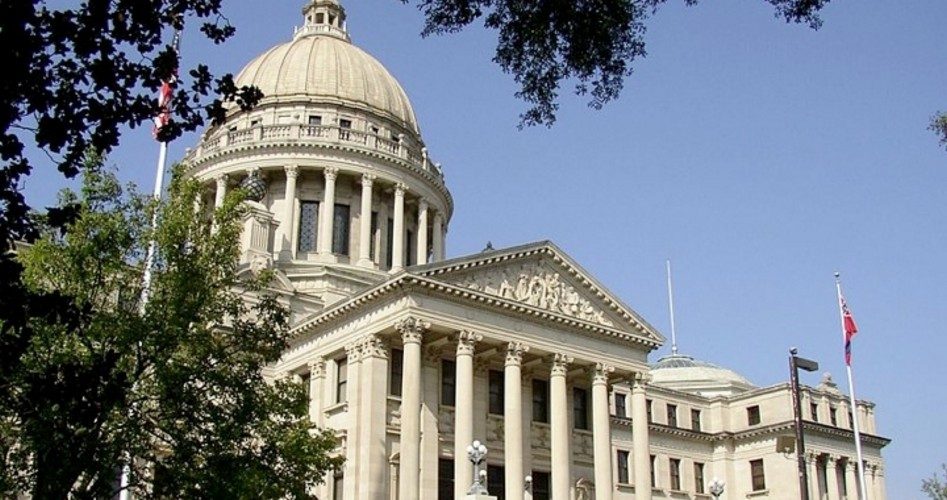
In the four decades since Roe v. Wade, state governments have passed laws that attempt to regulate abortion without specifically banning it. The National Conference of State Legislatures in February published a checklist of those laws. Most of these state laws do not purport to ban abortion, but rather exercise the normal policing power which has been exercised by state governments since before the Constitution. State laws attempting to regulate abortion, however, face tough going from the federal government.
Mississippi just passed a law in its last legislative session which would require that doctors who perform abortions have admitting privileges at a local hospital and that the abortion be performed by an obstetrician/gynecologist. The Mississippi law in question simply states that:
All physicians associated with the abortion facility must have admitting privileges at a local hospital and staff privileges to replace local hospital on-staff physicians. All physicians associated with an abortion facility must be board certified or eligible in obstetrics and gynecology, and a staff member trained in CPR shall always be present at the abortion facility when it is open
The Mississippi law was hardly radical: Thirty-nine other states require that the procedure be performed by an obstetrician/gynecologist and nine other states require that the physician performing the abortion have privileges at the local hospital. Moral issues aside, there are commonsense reasons for these requirements. Ob/gyns are specialists in female health, particularly as it relates to reproduction. Abortions are surgical procedures that can develop complications which threaten the health, even the life, of the woman whose unborn child is killed.
Yet Federal District Court Judge Daniel P. Jordan III has blocked the enforcement of this new Mississippi law, pending a full hearing on July 11. Jordan stated, “In this case, plaintiffs have offered evidence — including quotes from significant legislative and executive officers — that the act’s purpose is to eliminate abortions in Mississippi. They likewise submitted evidence that no safety or health concerns motivated its passage. This evidence has not yet been rebutted.”
Judge Jordan seemed swayed by what he believed were the intention of the legislative authors of the bill, which he believed was to keep abortion out of Mississippi. The physicians working at the Jackson Women’s Health Clinic, which is the clinic performing abortions in Mississippi, are certified as specialists within the new statute, but they have not been able to obtain privileges at any of the six hospitals in the area. The Clarion-Ledger in Mississippi has noted that the owner of the Jackson Women’s Health Clinic “was recently forced to surrender its license after two patients were given an overdose of a drug designed to prevent blood loss.” The article notes that sloppy medical care might account for the reluctance of hospitals to grant privileges to physicians who work at the abortion clinic. Three out of the four abortionists working at that clinic do not even reside in Mississippi, which would suggest that Mississippi has a legitimate state interest in protecting its citizens against physicians who are not originally licensed by the state.
State legislatures across the country have run into problems with laws that simply try to provide the same sort of regulation of abortion that is required in other medical procedures. States that have provided for 24-hour waiting periods between the mother’s request for abortion and the actual killing of the unborn child have not been voided by federal courts, but when Tennessee tried to institute a 72-hour waiting period, a federal district court struck that down as unconstitutional as well as the provision of Tennessee law that required the mother be informed that abortion constituted major surgery. Federal courts have also blocked laws creating a statutory waiting period for abortion in Montana, Delaware, and Massachusetts.
Arizona passed a law that required that a mother be fully informed of the risks and consequences of an abortion before the procedure was performed; however, a federal court in Arizona has blocked, at least for now, the implementation of that law. California and New Mexico laws required the consent of one parent for an abortion on a minor child, but federal courts in those states have declared these laws unconstitutional. Montana, Nevada, Illinois, and New Jersey state laws simply required that a parent be notified before an abortion is performed on a minor child, but these laws were also determined by federal judges to violate the Constitution.
These state laws do not ban abortion. The laws are simply efforts of state governments to exercise the inherent police powers that the Constitution vests in them. States, after all, determine when the taking of a human life is murder, criminal homicide. or justifiable homicide. States determine when sexual relations are lawful and when they are rape. State laws determine when a patient is consenting to a medical procedure and when not.
Before Roe v. Wade, states could legalize abortion (and some states did), allow abortion in the case of rape or incest (and many states did), or outlaw abortion. Now, with federal judges taking the place of state legislators in our nation, not only can states not outlaw abortion, they cannot exercise prudent and reasonable regulation of the practice of medicine or the protection of parental rights regarding their minor children.
Photo: The New Mississippi State Capitol


